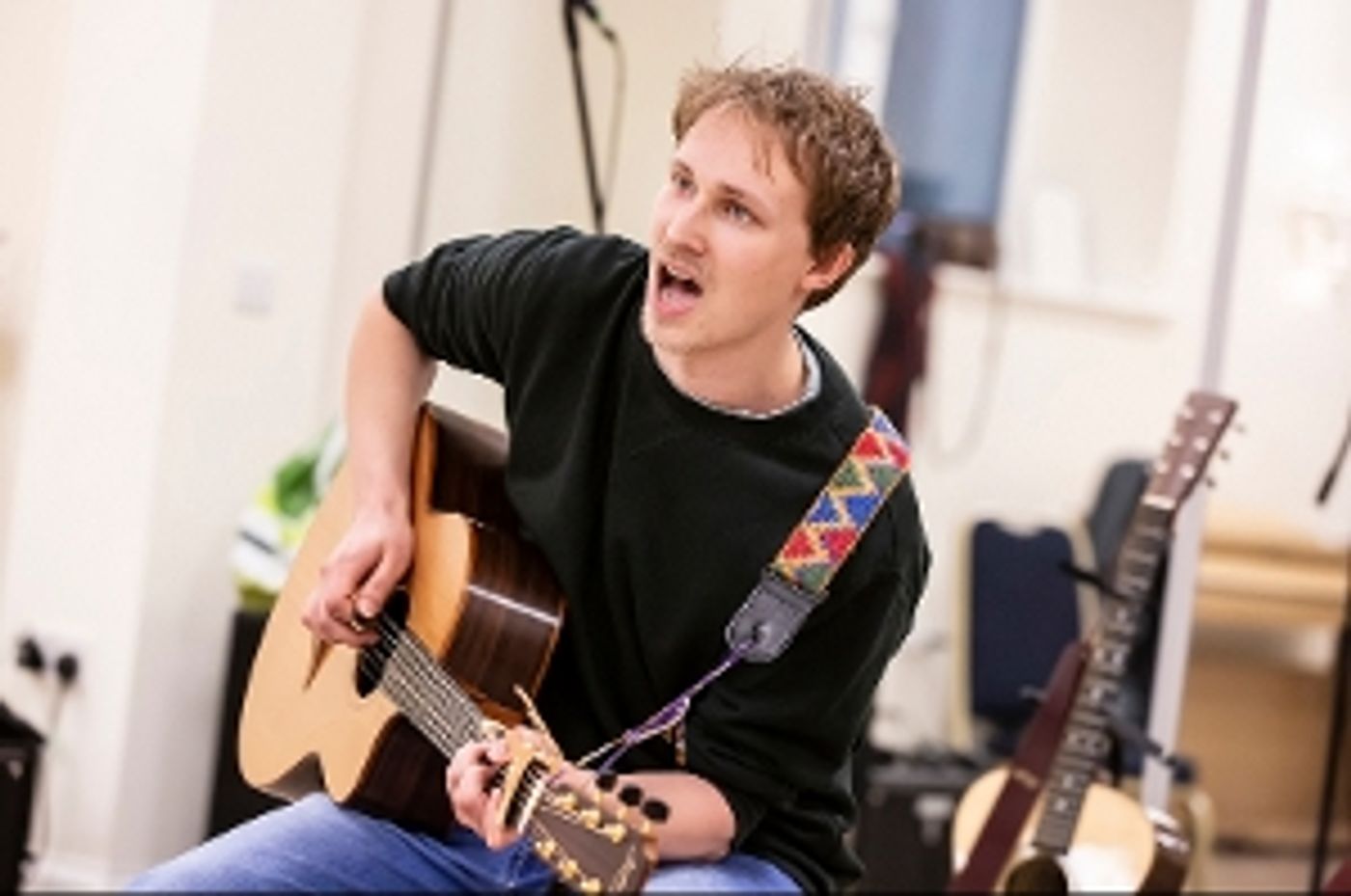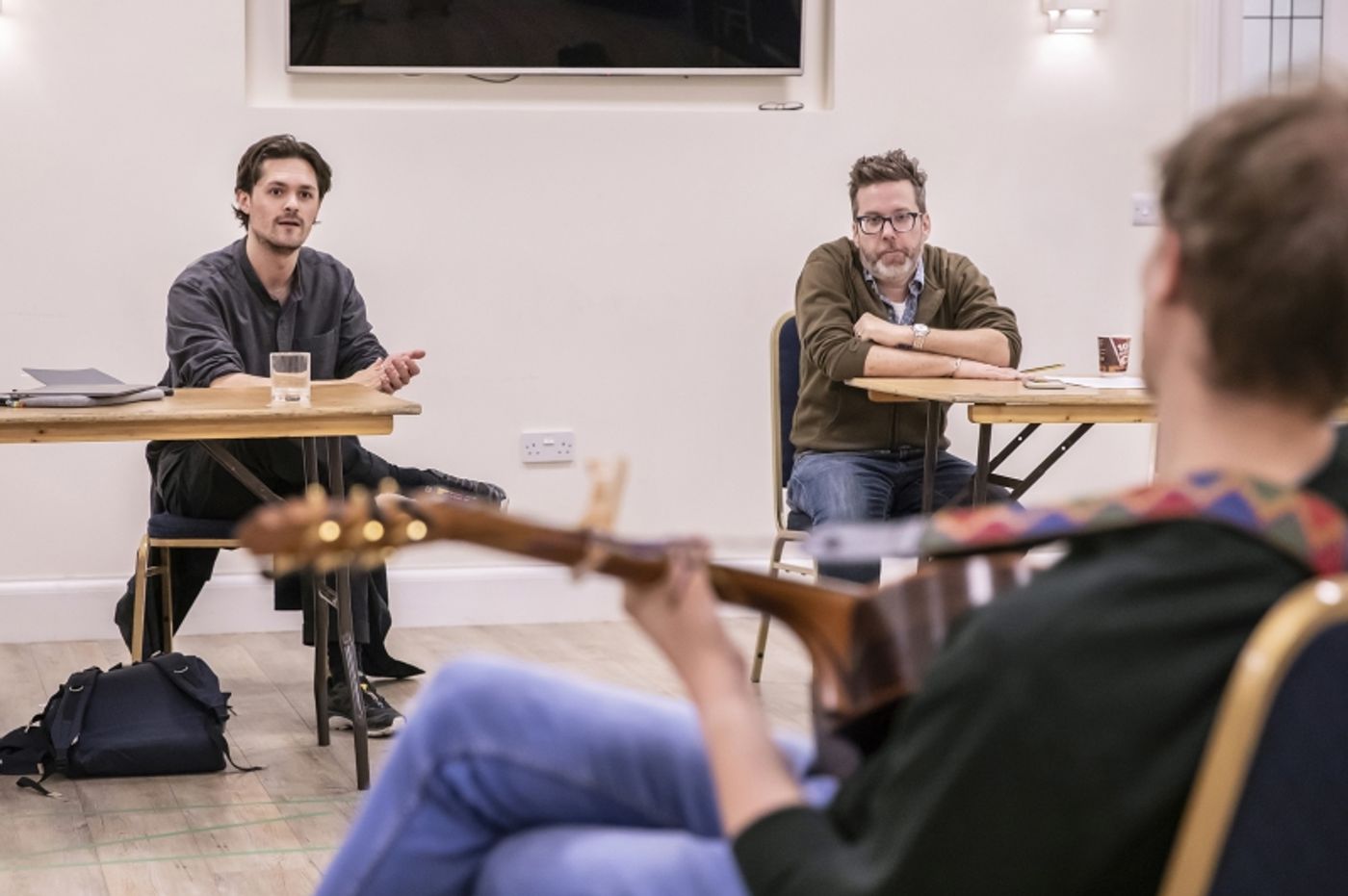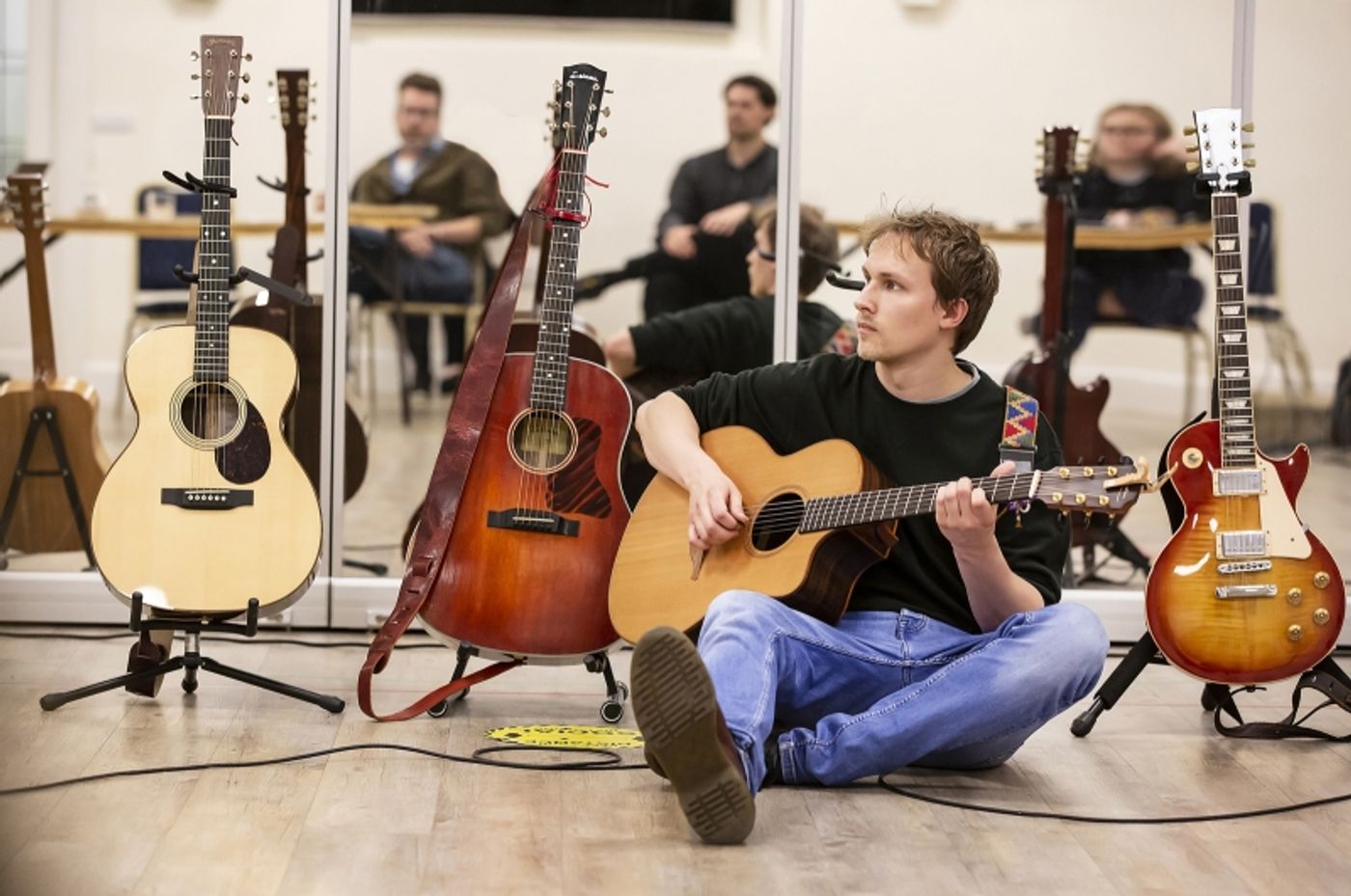Interview: THE LION Team Talks Arizona Premiere, Evolution of Musical Theatre, at Arizona Theatre Company
One-man show comes to Arizona after an acclaimed London stint.

Last summer for me was one for the books. I had the good fortune to visit London and absorb the city's renowned theatre scene -- a significant item off the proverbial bucket list. From revered classics at Shakespeare's Globe to trenchant innovations at National Theatre and the West End, a prolific smorgasbord was the antidote to the sweltering ennui of Arizona's "down time."
Fulfilling as that sounds, play-binging was ancillary to my chief assignment in the city. As an arts educator on a mission, I was tasked to research a little-known musical in the southern borough, titled THE LION, a one-man production written by singer-songwriter Benjamin Scheuer and co-directed by Alex Stenhouse and Sean Daniels.

The show had made a successful Off-Broadway run and subsequently toured the USA, closing in 2017 after 500 performances. It would take a few years to commence any talk of a revival, notably due to the onerous task of replacing Benjamin Scheuer, who was ready to move on to another life phase.
Benjamin's "retirement" from the run was a culmination of his quest to heal from Stage 4 cancer and to cope with the untimely and devastating loss of his father.
Serendipitously, a talented young man named Max Alexander-Taylor was discovered just as talks of a revival were resuming. Playing the role of Ben, he would leave his own mark as he bowled over London audiences in a critically acclaimed run at Southwark Playhouse.
Now begins Max's promising run of his own. In association with London producer Danielle Tarento, Arizona Theatre Company is poised to show desert audiences what all the chatter is about, bringing THE LION to open ATC's 55th season.
Below is an excerpt of my recent conversation with the team, composed of artistic director Sean Daniels, London co-director Alex Stenhouse, Max Alexander-Taylor, and recently commissioned understudy Jake Allen, an accomplished singer-songwriter from Michigan.
BWW: Max got sick on the day the show opened, so I missed his performance. Fortunately Benjamin was kind enough to fill in for a concert version, which was fabulous on its own. The venue was ideal in terms of size and the intimacy it afforded the audience. My question is a rather obvious one: How does a show this small transfer to a large proscenium theater, given the element of intimacy I just alluded to?
Sean Daniels: Ben played part of the show at The Royal Albert Hall, which is like, 1,400 seats. And the nice thing is, it's always about the story, right? It's always about what we're telling and people connecting to him. What we were doing even today was making adjustments, how to make sure that Max feels connected with people, what feels authentic and connecting.
ALEX: Everything has been slightly scaled up. The stage floor is a little bit bigger, the mirrors are a little bit wider and taller. Everything is made a little bit bigger but not so much bigger that it would make Max look smaller in that space.
BWW: Musical theatre as an art form has really evolved, such that conversations are changing about what it means and what it looks like. I have a student, who'd seen the poster for the show, and she asked me if THE LION was a concert. That's a valid observation, yes?
ALEX: We have "gig theatre" in the UK. Do you have gig theatre in the States? It's a hybrid "concert-theatre" production. I would say this exists in the intersection of gig theatre, musical theatre, solo show...it's a big emerging movement.. This [THE LION] is structured like a musical. There's a lot of musical elements, but it's also a one-person show.
MAX: Structurally, it's a musical. "Gig theatre" is an interesting term. I think gig theatre is a way of saying, "It's a musical for people that don't like musicals." But for me it's very much a musical. Narratively it flows in terms of what songs do in the piece. They're narrative songs, and when they're not that, they are explorations of moments, which is what Rodgers and Hammerstein originally coined as what a musical theatre structure was. So for me it's a musical, it just doesn't particularly feel like one because there's no fourth wall; I'm talking to the audience.
ALEX: I think there's a level of concert-ness baked into this because Benjamin (Scheuer) wrote the show by essentially gigging it in coffee shops. The original basis of this show is built around songs with the anecdotes that you tell between songs that link you from song to song. But what we want to do with this piece, actually, is make it slightly more of a show, more of a musical. One of the things we did is take away "mics on stands" and replace them with head mics, so that it can be performed around the space...it allows us to use staging and blocking [so that] it's a theatre piece, whereas in a concert you're sort of restricted to where the microphone is.

MAX: This is a definition of what Stephen Sondheim gives of the difference between musical theatre and opera. And I think it applies to concerts and musicals as well in the same way. An opera is anything that's done in an opera house to an opera audience. If you did PORGY AND BESS here and staged it in front of a musical theatre audience, it would be a musical. But as soon as you stage it in an opera house I think of a similar way because people here are expecting to see a musical. That's what they're getting. Expectation, I think, defines a lot of what you're seeing.
ALEX: There was a term in the 80's, music theatre, that became very popular at least in the UK - a play with songs. The connotation of what a musical is, to some people, can be this thing that is shallow, or "jazz hands," which obviously is a generalization and doesn't apply to the vast majority of musicals. All over history people have used different terms to try and [define it].
MAX: In the US, you're proud of musical theatre, right? That's very much a national art. It was created here in the 20s and 30s by pioneers of the form. Everyone in America is proud of it. No one sees it as sappy.
ALEX: Adam Lenson writes in his book, Breaking Into Song - he talks about the difference between THE musical and A musical...you'll often have "something, something - A new musical," comes over to the UK and they turn it into "THE musical." And the idea of "THE musical" is this idea that it can almost exist without the music. You've got some shows like Fun Home - just FUN HOME. A comment -THE musical? Or was it a family musical? Or HAMILTON: AN AMERICAN MUSICAL. The way that we talk about musicals is always trying to also define what a musical is and what a musical can be. And I feel like there's a tendency to want to call something like this NOT a musical, because it's a show that people who don't like musicals would like. But that's why we need to call it a musical - to expand the idea of what a musical can be.
BWW: Would you say the genre is changing?
ALEX: Not the genre - the medium. And that's the point, people think that musicals are a genre. It's not; it's a form. It's a medium of storytelling. Within that, there are loads of different genres. A Sondheim show is so different from another Sondheim show (or Andrew Lloyd Webber, or Rodgers and Hammerstein, or Michael R. Jackson show, or THE LION). To me, musicals are a piece of theatre in which music is one of the primary forms that story and emotion can be communicated.
JAKE ALLEN: As somebody new coming into it - I come from a singer-songwriter world - it feels super accessible to somebody like me. I wouldn't consider myself a fan of musicals; not that I don't like them, but I don't go out to see them. I would definitely go to see this. It's like saying a musician infiltrating the musical world. It appeals to a wide array of people, it's versatile. One more thing to add, too: As a solo artist, I understand the importance of giving people a reason to care about a song, telling some kind of anecdote beforehand. And it's becoming more and more prevalent. Tell the story. Get people to invest in the song, and when they hear it they'll love it that much more. In my solo shows it's something that I already do, but then seeing that same thing happen in a totally linear show, where it's a timeline, it's kind of like giving you that reason to care about the song, times ten!
BWW: I saw Ben's performance in London and was absolutely moved by it. A big part of that was him telling his own story. I'm curious to hear Max's take on what it's like to play Ben from an actor's point of view.
MAX: Initially I felt a lot of responsibility. The more I did it, the more I detached it from Benjamin.
BWW: So you began to own it.
MAX: Yeah, otherwise you're doing a pastiche, an impression, and you're trying to recreate someone that you know - and that ultimately isn't a particularly useful way to act, I don't think. So the more that I could extrapolate and relate it to other people as opposed to just Ben...for example, I was having dinner in a restaurant near my house, and I was talking to a waiter there. He told me a story about how a lot of his family passed away during the pandemic, including his wife, his sister ...he lost everything. It was really horrible. And then that night, as I was doing the show, that started coming back to me. The show started relating to so many other people. It wasn't a responsibility as much; I felt I could help people by giving them a story they could relate to on some level. It was very freeing.
ALEX: You were playing Ben, you weren't playing Benjamin. That's a big distinction. In the writing of THE LION in the various iterations of the show, you turned your life into various crafted anecdotes for the best dramatic effect for the story. There's always gonna be a slight level of making the story a little bit more compelling for an audience. What we did is we took what's on the page and built a character around it. So we built the character of Ben out of the script organically, with Max in the rehearsal room, rather than trying to recreate who Benjamin was. We created Ben off the page.
BWW: What's the future of THE LION after Phoenix?
Sean Daniels: This production goes to Cincinnati Playhouse in the Park directly after Phoenix. The hope is to keep it going. Before, when it toured, there was theater after theater that wanted it, but Ben was just at the end of performing. So the hope now is that it keeps going. And what's amazing about this is that we now have two people that can perform it.
BWW: Is it tough to sell a show like this?
Sean Daniels: The nice thing about this is [while] people don't know about it, it has so many glowing reviews. In London we had that page of 5-Star reviews. And I think if you're gonna take a chance on something it helps when...in New York, in LA, in London, in Washington DC, it's had the same effect. It's a real credit to the writing that everywhere it's gone - I mean, all theater is local, but there doesn't seem anything local about this story. I just think the idea that great things can come from awful things is a universal truth that we need to believe.
BWW: Let me address an elephant in the room -- the set of guitars on stage. I get that it has to do with the different tuning so you don't have to make that change on the same guitar while trying to continue the story. Because each guitar looks so distinctive, it makes me wonder if a certain personality is attached to the guitar depending on the song being played. Am I making sense?
MAX: The nice thing about having so many guitars, besides the fact I get to play more guitars, is that they are characters within themselves. So each tuning has a different tone to it anyway, they work on different chords. Each guitar has a different sound profile and character in and of itself...Alex came to my apartment in London before rehearsals and we nailed down which guitar [worked for] which tuning. We went through guitar by guitar and we tried every tuning out, and almost every song on every guitar, and worked what the best variation was because that guitar was that song. Benjamin and I went shopping for my first guitar to do this show, and we found a Lowden, which is a Northern Irish luthier, and we played "Dear Dad" on it, we hit one chord, and we both said, "Ah, that's it!"
Sean Daniels: [The guitars] are the co-stars of the show.
MAX: The biggest co-stars of the show is the audience. The audience is what keeps the show alive and fresh.
THE LION shows Tucson 9/24/22 - 10/15/22 Phoenix 10/20/22 - 11/06/22
Videos

